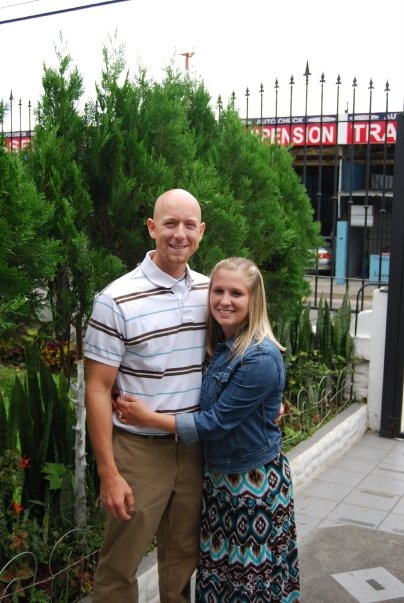Jason and Kerby Harpst go to Grace. They’re small group leaders. They’re key volunteers in Grace Acres. And we’re sending them out, to Costa Rica, in June. To be honest with you, they’ve become such a vital part of Grace that we hate to see them go. However, we rejoice with them as they are following God’s lead and leaving life as they know it in America. If you haven’t met Jason and Kerby, I hope you get to one day. Until then, I thought I’d post some questions to help you get to know them.
1. Where are you going in Costa Rica?
We are going to the small town of Villas de Ayarco, which is in the mountains about 45 minutes southeast of the capital city of San Jose.
2. What will you be doing while you’re there?
We will initially work with short term teams that come to Costa Rica as the Volunteer Team Coordinators for the Abraham Project. We will also work with the children that live in any of the three orphan homes that are part of the Abraham Project. Our vision is to set up a sports outreach program for the children and teens of the local community, where the average family lives at the “extreme poverty” level.
3. Why Costa Rica?
Costa Rica is a place we have both visited before and we saw a great need for our help. The Abraham Project, in particular, is in need of help to expand on their vision and to reach more of the hurting people of Costa Rica through the love of Christ. With such a high cost of living, so many of the people cannot afford food for their children everyday and the local communities are filled with drugs, prostitution and gang activities. It is too easy for young children to get involved in these activities that are all too common for them. If they have an alternative choice to devote their time, such as a sports program that is based in the love and need for Christ in their lives, then they have a bright future…spiritually and socially.
4. Do you see this as a temporary thing, or something more permanent?
This is a permanent move. As we surrender to God’s calling, we feel this is a permanent move. Not a permanent move to Costa Rica in a sense, but a life devoted to what ever God has planned for us. Where ever He leads us in the future, we will follow in effort to reach more people around the world for Christ and expand His Kingdom.
5. What did you do prior to committing to going to Costa Rica?
I have my Bachelor’s and Master’s degrees in Mechanical Engineering and I have worked for both the Trane Company and General Motors Corporation. My wife, Kerby, is finishing her degree in Special Education this spring.
6. Why not continue doing that?
To be honest, it would be easy to continue my work as an engineer and having Kerby work as a school teacher. We could live comfortable lives and have a great place to raise a family in the United States but that would be our plans not God’s plans. God has specifically asked us to give that up, and go share our love and hope we have in Him. God calls everyone to a different path in his plan to spread the great news of Christ; some are called to only short term mission trips, some are called to support full time missionaries, some are called for local missions, and some are called to go as full time missionaries overseas. For us, we fit into His plan as a family that will go and tell people about Christ. It will not be easy, but we know God will provide for our needs.
7. Have you been to Costa Rica before?
I have been to Costa Rica seven times. Six times for short term mission trips and once in January for a “pre-moving” trip and to meet with the pastor and others we will work along side with at the Abraham Project. Kerby has been to Costa Rica twice before.
8. How do you feel uniquely gifted for what God’s calling you to do in Costa Rica?
As an engineer I am very organized which will help in the Team Coordinator aspect of our work in Costa Rica. Additionally, Kerby will be teaching English in the daycare center at the orphanage. With her specialty in Special Education, it will benefit her greatly when working with these children with physical and social disabilities. We have also spent the past three years working with the children of Grace Community Church each Sunday in Grace Acres. As far as being “qualified” to be full time missionaries, we are not, but I don’t know if anyone is really qualified. We firmly believe in what many international mission organizations are based on. God does not call the equipped, but instead, He equips the called. We have much to learn about being missionaries, but our focus is on serving our all powerful and wonderful God and sharing with others what He has done in our lives.
9. What are some challenges you’ve already faced in preparing to become a full-time vocational missionary in Costa Rica?
One of the biggest challenges is seeking financial support. We are not affiliated with any international missions agency so we need to raise 100% of our financial support. Costa Rica has a high cost of living; where a simple $8 Wal-Mart coffee maker here in the United States costs over $30 in Costa Rica. By not receiving any of our financial support from a missions organization, our support will come strictly from friends, family members, fellow church members, or anyone else that shares our hearts for Costa Rica. We have had other small struggles since making the decision to enter the mission field about five months ago, but it has been amazing to see how God works and we have seen first hand what He can do if our plans are aligned with His plans.
10. What is your biggest need right now? Is there a way we can help?
We need monthly supporters. We have a few individuals that have been very committed to supporting us financially and we cannot express how thankful we are to have them partner alongside us. We leave for Costa Rica at the beginning of June and what we really need right now are individuals that can commit to supporting us each month. Nothing is too small or too big. If you would like to support us, you can send a tax deductible check to “Grace Community Church” with a note of “Costa Rica” or “Jason and Kerby” to the following address.
Grace Community Church
PO Box 3980
Clarksville, TN 37043
You can follow us on our blog at www.todalagentecr.blogspot.com and you can always email us with questions or for more information at todalagentecr@gmail.com.




